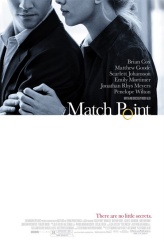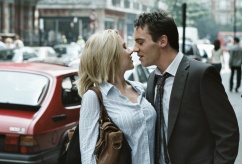| Match Point |
| |
 |
US/UK, 2005. Rated R. 124 minutes.
Cast:
Jonathan Rhys-Meyers, Scarlett Johansson, Emily Mortimer, Matthew Goode,
Brian Cox, Penelope Wilton, Ewen Bremner, James Nesbitt
Writer: Woody Allen
Original Music: none
Cinematography: Remi Adefarasin
Producers: Letty Aronson, Lucy Darwin, Stephen Tenenbaum, Gareth
Wiley
Director: Woody Allen
LINKS
|
 oody
Allen's New York-centric world hasn't changed much in four decades. Twenty-one
year olds bond over Humphrey Bogart, quote Dostoevsky, and go see Diana Krall
sing (Anything Else). He casts
himself as a romantic lead well past sixty (The Curse of The Jade Scorpion,
Hollywood Ending). If he stays out of a film, he'll ask another actor to
embarrass himself by adopting the same mannerisms and neuroses (Kenneth Branagh
in Celebrity).
oody
Allen's New York-centric world hasn't changed much in four decades. Twenty-one
year olds bond over Humphrey Bogart, quote Dostoevsky, and go see Diana Krall
sing (Anything Else). He casts
himself as a romantic lead well past sixty (The Curse of The Jade Scorpion,
Hollywood Ending). If he stays out of a film, he'll ask another actor to
embarrass himself by adopting the same mannerisms and neuroses (Kenneth Branagh
in Celebrity).
Thank goodness that for his latest film, Allen has left New York and left himself
out of the script. Match Point is set and shot in London. It contains
no Allen-like surrogate. Characters bottle up their neuroses instead of wearing
them on their sleeves. The only other Allen movie Match Point resembles
is the dark comedy/drama Crimes and Misdemeanors, wherein Martin Landau
commits and learns to live with a horrific crime. Match Point resides
somewhere between that film and The
Talented Mr. Ripley, referencing Dostoevsky's Crime & Punishment
all the way.
Allen builds Match Point around a metaphor that's nothing short of inspired.
Protagonist Chris Wilton (Jonathan Rhys-Meyers of Bend
It Like Beckham) opens the film in voiceover, explaining the role of
luck in life and tennis. There are moments in the match when the ball hits the
top of the net, and for a split second it can either go forward—spelling
victory—or fall backwards, ensuring defeat. If you think you know how this
comes into play later, you don't.

Scarlett Johansson and Jonathan Rhys-Meyers star in
Match Point. |
Chris is a washed-up tennis pro who takes a teaching job at an exclusive London
tennis club intending to use it as a stepping stone to something better. He
casually, cleverly worms his way into the graces of the posh Hewett family,
befriending young Tom (Matthew Goode of Chasing Liberty) over a shared
interest in opera and then attracting the romantic interest of Tom's sister
Chloe (Emily Mortimer of Lovely and
Amazing). Does Chris really like opera, or did he do his homework on
the Hewetts? Allen never says. Chris, who insists on paying for Chloe when they
go out even though it's difficult for him, understands the key to entering the
Hewitt's world is to appear not to want it. It is better to be mysterious than
needy.
Chris hits the jackpot with his engagement to Chloe. Her father Alec (Brian
Cox of The Bourne Supremacy and Red Eye) and her mother Eleanor
(Penelope Wilton of Pride
& Prejudice and Iris) welcome him into their family unquestioningly.
Seeing how in love Chloe is, Alec brings Chris into his company and puts him
on the fast track.
Everything is exactly as Chris wanted, except one thing. Chris can't keep away
from Tom's slightly inappropriate fiancée, struggling actress Nola Rice (Scarlett
Johansson of Lost in Translation
and Girl with a Pearl Earring).
Alluring and unattainable, Nola rejects Chris's advances, but things change.
Eventually, Chris must choose between passion and the comfortable lifestyle
he's worked so hard to earn.
As he readily admits, Rhys-Meyers really isn't a good tennis player, but otherwise
makes a fantastic Chris, inscrutable and controlled except for his compulsive
desire for Nola. This desire, which could destroy him, is perhaps a sign that
Chris is not totally comfortable in the posh world he has attained. Nola provides
him with a necessary outlet, a person with whom he can indulge instinct and
impulse. The talented Johansson, recovering nicely from the debacle of The
Island, is just as good. While Nola's transition from aloof seductress to
train wreck is a bit abrupt, Johansson holds Nola's disparate elements together
by showing that Nola's anxiety about her affair with Chris traces as much to
her distaste for her own behavior as to a need to actually be with him—a
need that seems improbable at best, given how independent and worldly she seems
at the start.
Meanwhile, the able actors playing the Hewett family give spot-on depictions
of what Allen calls the arrogance of class. They are not overly haughty or self-important;
they are not even necessarily bad people. Their privileges are just taken for
granted. It's nothing to Alec to hand Chris a career on a silver platter; it
never occurs to him that a harder-working, more experienced employee is getting
shortchanged.
You could argue that Allen's characters in Match Point still don't act
or sound like anyone you know. (Seriously, twenty-somethings who love opera?)
Perhaps. However, such characters seem far more appropriate here, in the rarified
air of British high society, where a lot of people don't act or sound like anyone
you know. Plus, Allen has their emotional repression—quite an Allen departure,
incidentally—exactly right. Regardless, how the characters sound matters
little. Match Point is not driven by conversational interactions—another
departure for Allen—but instead delves into complex social dynamics and
motivations. Like Crimes and Misdemeanors, Match Point is a complicated
morality play with ambiguous morality. In real life, things don't always get
resolved, people don't always get their comeuppance, and stories don't contain
messages. Now that's realism.
Review
© December 2005 by AboutFilm.Com and the author.
Images © 2005 Dreamworks Pictures. All Rights Reserved.


